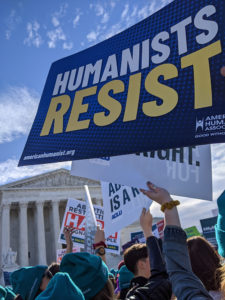COMMENTARY | Hope Remains in the Fight Against Theocracy
 The crowd outside the US Supreme Court on March 4, 2020 (photo by Rachel Deitch)
The crowd outside the US Supreme Court on March 4, 2020 (photo by Rachel Deitch) At the end of June, in the case of 303 Creative LLC v. Elenis, the six conservative judges of the U.S. Supreme Court ruled that it is perfectly legal for business owners to refuse to serve homosexuals. All judicial justifications and verbiage aside, this ruling is based—squarely and simply—upon the traditional religious belief that there is a magical, invisible, all-powerful deity who disapproves of homosexuality. Even though LGBTQ+ people cause no harm or suffering in society, and even though our Constitution is explicitly meant to provide protection for hated minorities from a hostile majority, and despite decades of legal precedence against such forms of bigoted discrimination, these pious justices have placed their brand of Biblical faith over and above our secular, democratic system of law.
And our nation is now less just.
Of course, these judges—like all Americans—have every right to hold religious beliefs as deeply and sincerely as they wish, and to let those beliefs guide their lives, inform their choices, and shape their morality. But what they should not be able to do, is impose their version of the Christian faith on the rest of us, thereby curtailing the rights of those of us who do not share their spiritual worldview.
In the wake of 303 Creative LLC v. Elenis—as well as other related rulings such as Carson v. Makin, Kennedy v. Bremerton School District, and Greece v. Galloway—a specific segment of conservative Christian Americans will enjoy greater privileges: their prayers will dominate public and civic spaces, their private schools will be subsidized by everyone else’s tax dollars, and their distinct version of theistic morality will be bolstered as they deny services to those they personally deem sinful or unworthy. And the rest of us—those who don’t want to join in Christian prayers at public school sporting events or at city council meetings, who don’t want our tax dollars paying for Christian, Jewish, Muslim, Sikh, or Scientological indoctrination, and don’t want society’s morality determined by esoteric belief in supernatural beings—we will see our standing as full and equal citizens eroded.
What is needed—in the face of this ever-encroaching theocratism—is a strengthened commitment to, and enlivened activism on behalf of, the First Amendment’s core principle of political secularism, which, as Thomas Jefferson explained back in 1802, sought to create a wall of separation between church and state. Or as President Ulysses Grant echoed, in 1875: “Leave the matter of religion to the family altar, the Church, and the private school, supported entirely by private contributions. Keep the Church and the State forever separate.” Or as President Ronald Reagan affirmed, a century later, in 1984: “We establish no religion in this country…church and state are, and must remain, separate.”
As the conservative Christians dominating the Supreme Court continue to trample upon this core, original, and formerly bi-partisan American Constitutional value, our democracy will suffer. After all, in a pluralistic, diverse, and multi-cultural nation such as ours, with every stripe of religious believer—as well as those who don’t subscribe to any religion at all—political secularism is the only mechanism that treats all such worldviews and belief systems equally: none are subsidized or privileged, none are harassed or oppressed, and all enjoy government neutrality when it comes to religion’s presence—or lack thereof—in our civic lives.
Fortunately, there are several rays of hope, amidst the darkening fog of fundamentalism. For the first time in our nation’s history, there now exists a nascent Freethought Caucus in Congress, led by Representative Jared Huffman (CA-2), which promotes public policy formed on the basis of reason, science, and moral values, and seeks to protect the secular character of our government by adhering to the strict Constitutional principle of the separation of church and state. Additionally, there are well-staffed activist organizations, in addition to the American Humanist Association, committed to secularism, such as the Freedom From Religion Foundation and Americans United for the Separation of Church and State, that are gaining both members and influence. Finally—and most importantly—our country is undergoing an unprecedented surge of irreligiosity, with record numbers of Americans embracing a secular orientation. We’re talking tens of millions of humanists, atheists, agnostics, skeptics, freethinkers, and countless others who simply prefer to live their lives without religion.
All of us—along with the comradery of the millions of well-meaning religious Americans who don’t seek to impose their faith on others—must double down on our passionate fealty to the human-created ideals of the Constitution that sought to keep secular government out of the business of religion and religion out of the business of secular government.
